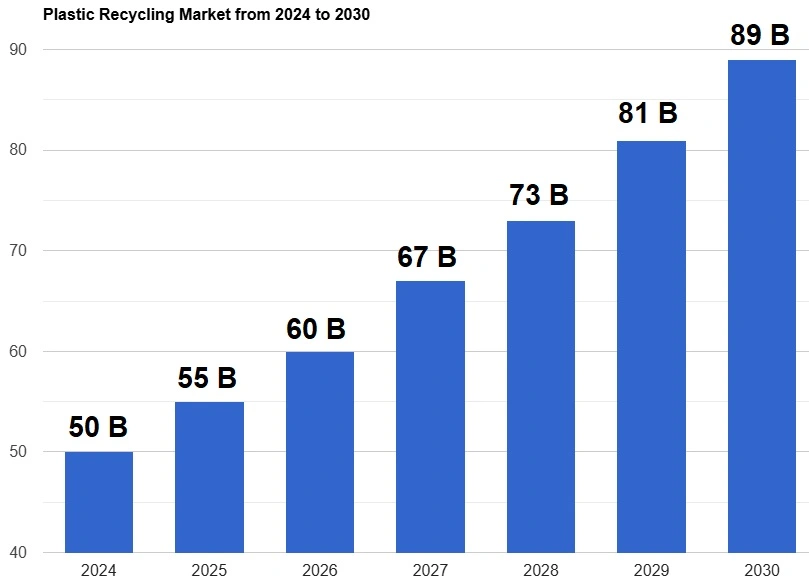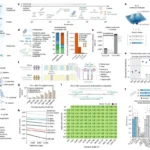Plastic pollution has become a global environmental concern, prompting a shift towards more sustainable waste management practices. In response to the pressing need to reduce plastic waste and conserve resources, the plastic recycling market has experienced significant growth. Plastic recycling plays a vital role in mitigating the environmental impact of plastics while contributing to a circular economy.
Plastic Recycling Market Analysis
The approximate decision of the Techgolly market research team is that the global plastic recycling market was valued at least USD 50 billion in 2024 and continues to be projected to reach USD 89 billion by 2030. Growth will continue at a compound annual growth rate (CAGR) of 8% to 10% from 2023 to 2030.

According to Grand View Research, the global recycled plastic market was valued at USD 55.98 billion in 2024 and is expected to reach USD 96.48 billion by 2030. The Allied Market Research said the global plastic recycling market size was valued at USD 27.9 billion in 2021 and is projected to reach USD 61 billion by 2031.
Reasons for Plastic Recycling Market Growth
As the world seeks to address the challenges of plastic pollution and promote sustainable practices, the plastic recycling market is poised for continued expansion. This market will contribute to a cleaner and more sustainable future. The primary reasons behind its growth are discussed below.
Environmental Awareness and Concerns
Growing public awareness of plastic pollution’s detrimental effects on ecosystems, marine life, and human health has increased support for recycling initiatives. This heightened concern is a significant driver of plastic recycling market growth.
Regulatory Initiatives and Legislation
Governments worldwide have implemented regulations and policies to reduce single-use plastics and promote recycling. These initiatives include extended producer responsibility (EPR) programs and targets for recycled content in products, driving market growth.
Circular Economy Goals
The concept of resources being reused and recycled has gained prominence. Plastic recycling aligns with this vision by reducing waste and conserving raw materials.
Resource Conservation
Recycling plastics reduces the need for virgin plastic production, conserving valuable natural resources such as petroleum. It also lowers energy consumption compared to the production of new plastics.
Technological Advancements
Innovations in plastic recycling technologies have improved the efficiency and quality of recycled materials. Advanced sorting, cleaning, and processing technologies enable the recycling of a broader range of plastics.
Consumer Demand for Sustainable Products
Consumers increasingly seek sustainable products with recycled content. This demand motivates manufacturers to incorporate recycled plastics into their products, spurring the plastic recycling market.
Economic Incentives
The economic viability of recycling has improved due to increased demand for recycled materials and rising prices for virgin plastics. Recycling has become a profitable venture for businesses.
Supply Chain Sustainability
Many companies are focusing on supply chain sustainability and reducing their environmental footprint. Incorporating recycled plastics into their products helps them achieve these sustainability goals.
Waste Reduction and Diversion
Recycling plastics diverts them from landfills and incineration, reducing the environmental impact of these disposal methods. This waste reduction benefits communities and the environment.
Innovative Packaging Solutions
Sustainable packaging solutions that utilize recycled plastics are gaining traction. Companies are increasingly adopting these eco-friendly alternatives to traditional packaging materials.
Collaboration and Partnerships
Collaborations between recycling facilities, governments, and industry stakeholders are promoting plastic recycling infrastructure development and market growth.
Global Plastic Waste Crisis
The accumulation of plastic waste in landfills, oceans, and ecosystems has spurred international efforts to address the plastic waste crisis. Recycling is a key component of these efforts.
Green Initiatives in Industries
Various industries, including automotive, construction, and electronics, integrate recycled plastics into their products. These industries’ commitment to sustainability drives demand for recycled plastics.
Key Market Players
The major plastic recycling vendors are Waste Connections Inc., Biffa, REMONDIS SE & Co. KG, Stericycle, Republic Services Inc., Veolia, Berry Global Group Inc., WM Intellectual Property Holdings LLC, Shell International BV, Clean Harbor Inc., and Covetsro AG.
Conclusion
The plastic recycling market is crucial for addressing the global plastic waste crisis and advancing sustainable development. With increasing environmental awareness, regulatory measures, and technological advancements, the market is set to experience robust growth. Key drivers include the shift toward a circular economy, consumer demand for sustainable products, and economic incentives for recycling. Collaborative efforts among industries, governments, and stakeholders further strengthen the market’s potential. As innovative solutions and green initiatives gain momentum, the plastic recycling industry will play a vital role in reducing pollution, conserving resources, and creating a cleaner, more sustainable future for future generations.





